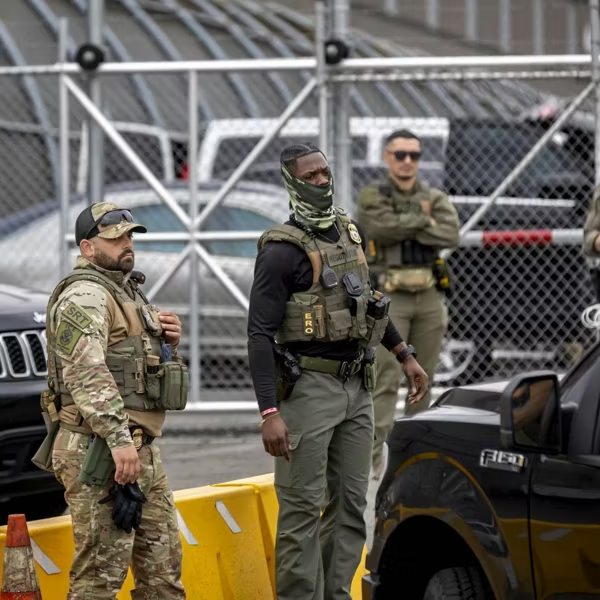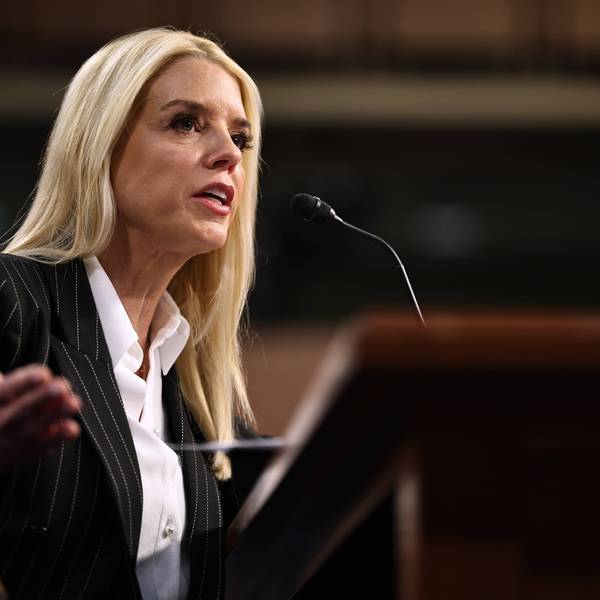At a Jan. 4 economic forum sponsored by the North Carolina Chamber of Commerce, newly elected Gov. Roy Cooper (D) asked businesses for help repealing the state's widely criticized House Bill 2, which, among other things, prevents transgender people from using the restroom that matches their gender identity and bars local governments from passing nondiscrimination protections for the LGBT community. Cooper said he thinks a clean repeal of HB2 would pass the Republican-dominated General Assembly, and he called on business leaders to pressure legislative leaders to put it to a vote.
Last month state lawmakers held a special session to repeal the law after Cooper, who had not yet been sworn in, brokered a deal with Republican legislative leaders and the Charlotte City Council, which had approved a local anti-discrimination ordinance that led to HB2's passage. The deal called for Charlotte to fully repeal its ordinance, which it did on Dec. 21 after an initial partial repeal. But Senate President Pro Tempore Phil Berger (R) and his GOP caucus didn't fulfill their end of the bargain by introducing and passing a clean repeal bill. Instead, they tacked on a moratorium blocking local governments from passing any nondiscrimination protections for LGBT people until 30 days after the 2017 legislative session, which would likely be sometime in late summer or early fall.
Democrats refused to vote for the measure, the deal collapsed, and so HB2 remains on the books. Besides taking a toll on the lives of lesbian, gay, bisexual and transgender people, the bill has dealt a major economic loss to North Carolina as many businesses have canceled plans to expand in the state while popular sporting events have been canceled and film productions have moved to other states.
Numerous news outlets have attempted to tally up the economic damage HB2 has inflicted on North Carolina. Back in September, Facing South conservatively estimated the law's cost at $230 million. Since then, the total has risen significantly, with documented economic losses resulting from HB2 now adding up to at least $562 million.
Here are the ways in which the law has cost North Carolina:
Companies flee: $297.4 million. PayPal was the first to go, nixing a data center that would have employed at least 400 people with a payroll cost of $20.4 million. Deutsche Bank ditched its plans to expand its North Carolina operations by 250 jobs, costing the state $27 million in payroll and construction. But the biggest and most recent hit was the loss of commercial real estate research business CoStar, which bypassed Charlotte because of HB2 and instead chose Richmond, Virginia, where the company is expected to create 732 new jobs and have a total economic impact of $250 million. This is a conservative estimate, as unnamed tech companies in Asheville and Raleigh that together would have created 1,500 new jobs reportedly decided not to expand in North Carolina, while Google Ventures halted investments in the state. Because the economic damage caused by these decisions couldn't be verified, they are not included in the total cost.
Sporting events move elsewhere: $245.6 million. The first and largest loss was the NBA All-Star Game, which would have had a roughly $100 million economic impact in the Charlotte area. Next was the NCAA, which pulled seven national championship events from North Carolina, including the first and second rounds of the men's basketball tournament. NCAA losses include $16.1 million to the city of Greensboro and $2 million to Cary. The Atlantic Coast Conference removed its championship games from the state, including Charlotte's football final, which would have brought the city $32.4 million, and Durham's baseball tournament, representing $5.2 million in lost revenue. WRAL estimated that total losses resulting from ACC and NCAA cancellations were $90 million. But that's not all: The Central Intercollegiate Athletic Association announced in August that it would relocate 10 championships; its men's and women's basketball tournaments alone earned Charlotte $55.6 million in 2015.
Conventions cancel: $18.4 million. WRAL reports that Raleigh has lost nearly $9 million from numerous cancelled conventions, and Greensboro has lost $6 million from eight conferences that moved out of state. As of late April, Asheville had lost around $2 million in tourism revenue. Orange County will lose a projected $1.2 million of previously expected tourism. By early April, at least 13 conventions had pulled out of Charlotte, and a May 20 estimate by the Charlotte Regional Visitors Authority based on seven of these put the lost revenue at $227,000.
Creating and defending HB2 costs taxpayers: $267,500. The North Carolina government is racking up hundreds of thousands of dollars in bills to defend HB2, with more costs to come as legal battles over the law continue. As of July, the state had already spent $176,000 on court costs, and former Gov Pat McCrory (R) spent $7,500 of government funds on travel to defend the law on television. The bill was created in a "special session" that cost taxpayers $42,000, and the recent special session that failed to repeal HB2 cost another $42,000.
Major performances defect: $208,000. Ani DiFranco, Blue Man Group, Boston, Bruce Springsteen, Cirque du Soleil, Itzhak Perlman, Maroon 5, Nick Jonas, Pearl Jam and Ringo Starr all canceled North Carolina performances because of the law. It's hard to find definitive numbers for how much these cancellations cost the state, but Greensboro Coliseum and its vendors alone say they have lost at least $208,000 because of HB2-related cancellations.
Other losses are more difficult to quantify. Because of HB2, film companies A&E Studios, Turner Broadcasting and Lionsgate pulled planned future productions out of North Carolina. The Lionsgate production alone would have provided 100 jobs. Director Rob Reiner said he won't consider North Carolina for any future productions unless HB2 is repealed, and other film companies including 21st Century Fox say they'll reconsider future projects in the state.
Travel bans to North Carolina in effect in the United Kingdom, five U.S. states and numerous cities are also costing the state money. Still more losses loom, including potentially $4.8 billion in annual federal funding, as the U.S. Department of Justice has said that HB2 violates seven federal laws including Title IX of the Education Amendment, Title VII of the Civil Rights Act and the Violence Against Women Act. However, federal action is less likely under the Trump administration.
Even if HB2 is fully repealed soon, its financial toll will last for some time.
As University of North Carolina at Charlotte economics professor John Connaughton said at this week's economic forum, "HB2 has already done the damage, and it's going to be with us for a while."



